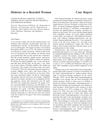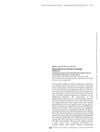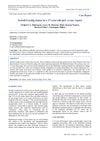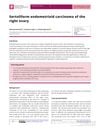 4 citations,
June 2005 in “Andrology”
4 citations,
June 2005 in “Andrology” A woman's diabetes improved after removing ovarian tumors that caused high testosterone levels.
 1 citations,
January 2017 in “International journal of women's health and reproduction sciences”
1 citations,
January 2017 in “International journal of women's health and reproduction sciences” Electroacupuncture improved symptoms of PCOS in a 19-year-old woman.
 67 citations,
September 2008 in “Dermatologic therapy”
67 citations,
September 2008 in “Dermatologic therapy” Hirsutism is excessive hair growth in women often caused by polycystic ovarian syndrome, and identifying the cause is important for managing associated health risks.
 20 citations,
January 2012 in “International Journal of Trichology”
20 citations,
January 2012 in “International Journal of Trichology” Most cases of excessive hair growth in women are caused by polycystic ovarian syndrome and are linked to higher free testosterone levels.
 10 citations,
March 2016 in “The Journal of Obstetrics and Gynecology of India”
10 citations,
March 2016 in “The Journal of Obstetrics and Gynecology of India” The article suggests renaming Polycystic Ovarian Syndrome (PCOS) to "Hyperandrogenic Persistent Ovulatory Dysfunction Syndrome" (HA-PODS) for accuracy and consistency, but no final decision was made.
 5 citations,
September 2021 in “Cureus”
5 citations,
September 2021 in “Cureus” Depression in women with Polycystic Ovarian Syndrome (PCOS) is linked to insulin resistance and hyperandrogenism, and managing these can help reduce depression. Lifestyle changes and Cognitive Behavioral Therapy can be effective treatments.
 4 citations,
May 2022 in “BMC Women's Health”
4 citations,
May 2022 in “BMC Women's Health” High levels of anti-Müllerian hormone can indicate polycystic ovarian syndrome in women who can have babies.
 November 2022 in “Journal of the Endocrine Society”
November 2022 in “Journal of the Endocrine Society” Removing the ovarian tumor improved the woman's hormonal symptoms.
2 citations,
August 2021 in “Experimental and Therapeutic Medicine” Moxibustion may help improve ovarian function by changing androgen levels.
2 citations,
November 2019 in “Case reports in women's health” Ovarian vein sampling helped diagnose rare ovarian tumors causing high testosterone, and surgery to remove the tumors lowered the testosterone levels.
 19 citations,
January 2015 in “Indian Journal of Dermatology”
19 citations,
January 2015 in “Indian Journal of Dermatology” Skin changes in women with PCOS are mainly due to hormonal imbalances.
 3 citations,
June 2016 in “Gynecological Endocrinology”
3 citations,
June 2016 in “Gynecological Endocrinology” Doctors used a special blood sampling technique to diagnose a woman's rare ovarian tumor that was producing male hormones.
 April 2024 in “International journal of reproduction, contraception, obstetrics and gynecology”
April 2024 in “International journal of reproduction, contraception, obstetrics and gynecology” A 17-year-old girl was diagnosed with a rare ovarian tumor, emphasizing the need for fertility preservation and psychosocial care.
 July 2023 in “Endocrinology, diabetes & metabolism case reports”
July 2023 in “Endocrinology, diabetes & metabolism case reports” Sertoliform endometrioid carcinoma of the ovary, though rare, has a good prognosis when treated early.
 November 2022 in “Journal of the Endocrine Society”
November 2022 in “Journal of the Endocrine Society” A transman experienced lasting virilization symptoms after stopping testosterone, which were resolved with estradiol treatment.
 30 citations,
July 2019 in “Endocrinology”
30 citations,
July 2019 in “Endocrinology” Certain HSD3B1 gene types are linked to worse prostate cancer outcomes and affect treatment response and other health conditions.
 23 citations,
February 1979 in “Veterinary Clinics of North America: Small Animal Practice”
23 citations,
February 1979 in “Veterinary Clinics of North America: Small Animal Practice” Treatment can improve survival and symptoms in dogs with Cushing's disease, but outcomes are unpredictable.
 4 citations,
January 2019 in “Obstetrics & gynecology science”
4 citations,
January 2019 in “Obstetrics & gynecology science” A PET-CT scan successfully located a hard-to-find Leydig cell tumor in a woman with hormonal symptoms.
 2 citations,
December 2021 in “International journal of Ayurveda and pharma research”
2 citations,
December 2021 in “International journal of Ayurveda and pharma research” Ayurvedic treatment helped reduce PCOS symptoms in a 19-year-old girl.
 1 citations,
September 2012 in “Expert Review of Endocrinology & Metabolism”
1 citations,
September 2012 in “Expert Review of Endocrinology & Metabolism” Androgen replacement therapy can improve libido and mood in women with severe androgen deficiency, but more research is needed on its long-term safety.
 December 2018 in “Journal of Advances in VetBio Science and Techniques”
December 2018 in “Journal of Advances in VetBio Science and Techniques” Low testosterone might be a common cause of hair loss in male dogs.
 991 citations,
January 2011 in “Nature Reviews Endocrinology”
991 citations,
January 2011 in “Nature Reviews Endocrinology” The document concludes that PCOS is a complex disorder caused by both genetic and environmental factors, affecting women's health in various ways, and requires personalized treatment.
 97 citations,
February 2007 in “Clinical Obstetrics and Gynecology”
97 citations,
February 2007 in “Clinical Obstetrics and Gynecology” The definition of Polycystic Ovary Syndrome may change with new research, and careful screening is key for managing the condition.
 96 citations,
February 2007 in “The Journal of Clinical Endocrinology & Metabolism”
96 citations,
February 2007 in “The Journal of Clinical Endocrinology & Metabolism” Women with type 1 diabetes often have polycystic ovary syndrome and excess male hormones, which are frequently undiagnosed.
 75 citations,
February 2016 in “The Journal of Sexual Medicine”
75 citations,
February 2016 in “The Journal of Sexual Medicine” Androgens play a role in female sexual function, and testosterone therapy can help women with low sexual desire, but more research is needed on treatments and long-term safety.
 46 citations,
July 1988 in “Journal of The American Academy of Dermatology”
46 citations,
July 1988 in “Journal of The American Academy of Dermatology” Hormone imbalances can cause specific skin changes, which may help in early detection of endocrine disorders.
 21 citations,
November 2012 in “Plastic and Reconstructive Surgery”
21 citations,
November 2012 in “Plastic and Reconstructive Surgery” Both genetic and lifestyle factors significantly affect female hair loss.
 14 citations,
February 2000 in “Feminism & Psychology”
14 citations,
February 2000 in “Feminism & Psychology” The entry showed that PCOS negatively affects women's self-image and is worsened by societal expectations, suggesting a need for more feminist attention to the condition.
 12 citations,
November 1993 in “International Journal of Dermatology”
12 citations,
November 1993 in “International Journal of Dermatology” The document explains that hirsutism, often caused by hormonal issues, can be managed with treatment to improve both physical appearance and mental health.
 9 citations,
July 2009 in “Journal Of Endocrinology, Metabolism And Diabetes Of South Africa”
9 citations,
July 2009 in “Journal Of Endocrinology, Metabolism And Diabetes Of South Africa” The document concludes that managing PCOS involves treating symptoms and reducing long-term metabolic risks, with lifestyle changes being important.




























